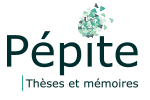Co-construction de l'alliance thérapeutique dans la prise en soin orthophonique : état des lieux des pratiques orthophoniques actuelles
- Alliance thérapeutique : relation thérapeutique ; état des lieux ; orthophonie
- Therapeutic alliance ; therapeutic relationship ; state of the art ; speech therapy
- Langue : Français
- Identifiant : LILU_SMOR_2021_015
- Faculté/Ecole : Médecine
- Date de soutenance : //2021
- Type de mémoire : Mémoire de Master
- Discipline : Mémoire d'Orthophonie
Résumé
En orthophonie, l’alliance thérapeutique n’est pas mentionnée en tant que telle dans la Nomenclature Générale des Actes Professionnels (NGAP). Elle s’apparente davantage à un élément inhérent et transversal de la prise en soin qui, corrélé au plan de soin, contribue à l’évolution favorable de celui-ci. L’objectif de notre mémoire est de faire un état des lieux sur les pratiques actuelles de l’alliance thérapeutique en orthophonie. Pour ce faire, des entretiens semi-directifs et un questionnaire ont permis de mener à bien ce projet. Les orthophonistes associent leur pratique à l’alliance thérapeutique. Dans leur pratique, les professionnels accordent une grande importance à la relation qui les unit au patient et à ses proches. Les accompagnants du patient sont davantage inclus dans le processus de prise en soin. Par ailleurs, les orthophonistes identifient les facteurs de risque de rupture de l’alliance thérapeutique dans leur pratique. En cela, la proposition de temps d’échanges et la qualité de la communication professionnelle constituent des modalités de réparation des ruptures de l’alliance thérapeutique. Enfin, le partenariat thérapeutique s’avère être un processus bénéfique tant pour l’orthophoniste que pour le patient et l’évolution de la prise en soin. De plus, il s’avère que l’alliance thérapeutique tend à être davantage présentée dans la formation universitaire actuelle.
Résumé traduit
In speech therapy, the therapeutic alliance is not mentioned as such in the NGAP. It is more akin to an inherent and transversal element of care which, when correlated with the care plan, contributes to the favorable evolution of the latter. The objective of our dissertation is to take stock of the current practices of the therapeutic alliance in speech therapy. To do this, semi-directive interviews and a questionnaire were used to complete this project. Speech-language pathologists associate their practice with the therapeutic alliance. In their practice, speech-language pathologists attach great importance to the relationship between themselves and the patient and his or her family. Those who accompany the patient tend to be more involved in the treatment process. In addition, speechlanguage pathologists identify risk factors for the breakdown of the therapeutic alliance in their practice. In this respect, the proposal of time for exchanges and the quality of professional communication are ways of repairing breakdowns in the therapeutic alliance. Finally, the therapeutic alliance has proven to be a beneficial process for both the speech therapist and the patient, and for the evolution of the care provided. Furthermore, it appears that the therapeutic alliance tends to be presented more in current university training.
AUTEUR
- Bouquet, Valentine



